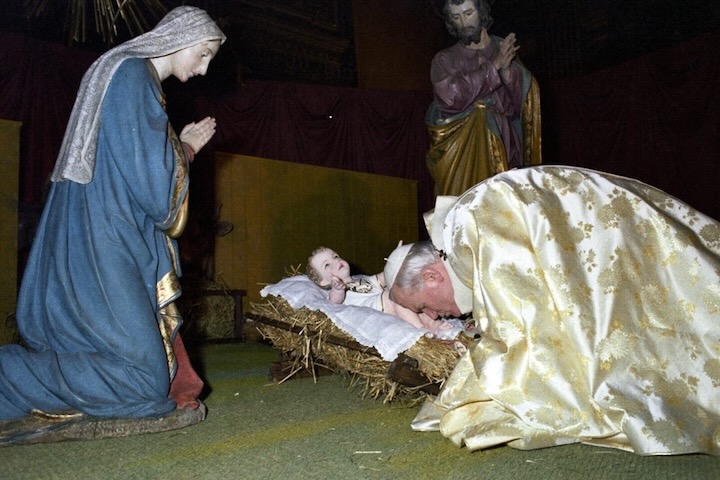Advent is a time of preparation for the Christ Child at Christmas. But in an age of endless appetites and distractions, it’s worth reflecting on who exactly that Child is.
I visited Poland as a young editor in 1989, a decade after Karol Wojtyla’s first visit to his homeland as Pope John Paul II, and just months before the Soviet-backed regime collapsed. I still remember how bleak it seemed. Many of Warsaw’s buildings stood on foundations two or three feet higher than the street. The reason was simple. The retreating Germans had literally leveled most of the city in 1944 as an act of pure malice. The devastation they left was massive. It was so costly to clear away in the war’s aftermath that new structures in Warsaw were simply built on top of the rubble.
The scars this left on Polish culture ran deep. The city’s skyline – to the degree it existed – was dominated by two structures. The first was the mausoleum-like Communist Party headquarters. The second was the Palace of Culture and Science, a “gift” from Joseph Stalin. Both were in the brutalist architectural style so widely admired by ideological thugs. The churches, by contrast, were little oases of beauty. They were like flowers in the cracks of a cement world, and they were never empty. They were also islands of sanity, committed to remembering the past quietly but accurately in a climate of political lies.
This was the world of John Paul II. What Poland experienced in the years 1939-89 was the crucifixion of an entire nation. It was carried out by two poisonous systems that differed mainly in the social theories they used to justify their inhumanity. Ideas are abstractions, but they have consequences. And in Poland they did, savagely.
In the case of Karol Wojtyla, the hardships he endured in his own life, and the suffering he saw in so many others, served as a kind of acid bath. It dissolved everything non-essential in his character; everything except a hard core of courage and clarity of thought that allowed him to believe in man because he believed in and trusted God – a God who so loved the world that he’d sent his only Son to redeem it.
He carried all of this with him into the papacy in October 1978. And it gives us the context for his first encyclical, Redemptor Hominis, or “Redeemer of Man”(1979).
For Wojtyla, the person of Jesus and our relationship with Him always come first. The morality and ethics that flow from that relationship are important. But they come second. Jesus Christ reveals to us the nature and dignity of our humanity. The duties that go with our humanity then follow from that ongoing encounter.

Karol Wojtyla, as John Paul II, would spend his entire papal ministry clarifying and refreshing who the Church is, because of who Jesus Christ is. For Wojtyla, the Church is not a collection of religious abstractions. She’s the bride of Jesus Christ, God’s Incarnate Word in the world.
God’s Word is a person, not merely a book or an idea. He became flesh. He dwelled among us. And He bequeathed to us the Church out of love, as the guide to our real home in heaven. But she remains His Church. She belongs to Jesus Christ. The Church belongs to us only in the sense that we first belong to her as her children, not her masters or architects.
The heart of John Paul’s encyclical is simply this:
Man cannot live without love. He remains a being that is incomprehensible for himself; his life is senseless if love is not revealed to him; if he does not encounter love; if he does not experience it and make it his own; if he does not participate intimately in it. This [is] why Christ the Redeemer “fully reveals man to himself”. . . .This is the human dimension of the mystery of the Redemption. In this dimension [of sacrificial love] man finds again the greatness, dignity and value that belong to his humanity. [10]
Redemptor Hominis grounds John Paul II’s papacy. Everything in his subsequent body of teaching builds from this text. It’s all there, explicitly or implied in seed form: the reality of objective truth; the mutual dependence of faith and reason; the sanctity of life from the unborn child to the infirm and elderly; the nature of human rights and progress; the priority of mercy; the meaning of human freedom; the dignity of work; the need for economic justice; and the centrality of the Eucharist for a life in Christ.
There’s a majesty of mind and spirit to the text, a majesty sorely missed today, that moves the reader even decades later. There are many reasons to call St. John Paul “the Great.” Redemptor Hominis is surely one of them.
I’ll end with one quick observation.
Some of the most arresting thoughts in Redemptor Hominis take place in Sections 15 and 16. Wojtyla notes that man’s advances in technology are dramatic and rapid. But our maturity in moral and ethical thinking can’t keep up. Thus, our enthusiasm for power over nature can lead by subtle steps to our becoming the victims of our own knowledge. Technology has a Mephistopheles effect. It always has unintended consequences.
In the years since Redemptor Hominis, the changes we’ve seen in genetic engineering, artificial intelligence, surveillance tools, weaponry, and a dozen other high-impact technologies have been transformative. We live in a time when transhumanist fantasies and the “eclipse of man,” to quote the Duquesne University scholar Charles Rubin, are becoming issues of urgency. Thus, the key challenges now facing the Church are neither environmental nor matters of ecclesial structure and process; they’re anthropological – in other words, who and what a human being is.
Next year, 2024, marks the 45th anniversary of Redemptor Hominis. This Advent, we need its wisdom more than ever. Because the Child we wait for is the redeemer of man.

















